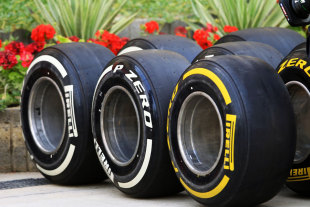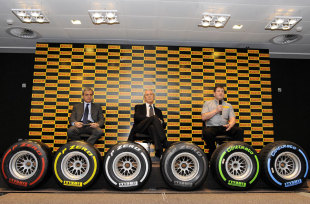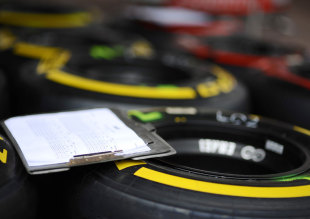
- In Focus:
- Tyres
I continue to be staggered by the number of so-called F1 experts who complain about the current era of Pirelli tyre performance. It's becoming a 'tyre formula', they groan. "It's no longer about the best car and driver," they complain.
Actually, on reflection, I guess we shouldn't be too surprised by the whining. Fashion, and following the pack, is everything in F1 - and many are those who do not wish to be left behind, even it if does mean re-writing a large chunk of history. Just when it became obvious, for example, that F1 needed the involvement of a gigantic car company like Toyota much more than Toyota needed F1, the Clamoring Throng decided to make Toyota the next Easy Target: what could smaller, established teams do with Toyota's budget? And why did they allow FOR the team to be run by a committee in Japan when autocratic Team Principals were doing the job superbly well in England? It was as if the F1 establishment wanted Toyota to pull out.
And so Toyota did. F1 lost the support and endorsement of what was then the world's biggest car company.
It was a similar story with Michelin. There were two easy solutions at Indianapolis, 2005: either a chicane should have been created; or, failing that, the Michelin runners should have started, nursed their tyres and raced for a point or two. It wouldn't have been the first time in F1 history that the teams and drivers would have mustered around their tyre supplier in order to limit the damage.
Instead, Michelin were hung out to dry with zero support from the F1 industry. The Michelin teams didn't return to the US that winter to apologize to US race fans; F1 as an industry didn't even show its support for Michelin. It was almost as if none of the F1 teams - amazing as it may seem! - had ever made mistakes in their own right…
And then, subsequent to Indy, key teams like Ferrari were allowed to accuse Michelin of cheating, claiming that their groove design was "guilty of a flagrant and deliberate breach of the technical regulations." That was never proved in a court of law - but the damage was instantly done. On the back of Indy, Michelin had no option but to withdraw.

Thus F1 created its most recent tyre monopoly. No-one complained when Bridgestone stepped smoothly into the breach, for Bridgestone had a wealth of development data on which to draw, a massive budget to spend and plenty of peripherals to sponsor. No-one even demanded an explanation from the FIA when the whole tyre groove regulation was suddenly forgotten; everyone relaxed and enjoyed the presence of the Japanese moguls. What no-one foresaw, of course - because F1 people are not brilliant at thinking more than a few months in advance, particularly when the money is flowing - was the downturn in the Japanese economy. Suddenly, with only about 12 months' warning, Bridgestone, too, announced their withdrawal.
The fallback, should no tyre company be attracted to F1, was always going to be the 'in-house' tyre option: F1 would effectively make its own tyres, brand the sidewalls if possible and live with the consequences. Not good. Not good for the technical pinnacle of motor sport - and not good for F1's prestige (or for its budgets). Tobacco money had gone; the dot-com bubble had burst; Toyota, Honda and BMW had pulled out; and Michelin and Bridgestone had both departed.
Then, at the last minute, Pirelli arrived. Of course they would not have the budget spend of a Bridgestone or the technical depth of a Michelin. How could they? On the other hand, Pirelli had/have enormous history in motor sport; a great brand and a great range of road tyres; plenty of enthusiasm - and both creativity and taste. Pirelli is, after all, an Italian company.
So you'd think, after the debacle that was Michelin's departure, or in the sad vacuum left by the big car companies, that F1 would for once have learned its lesson: which is (at the risk of stating the obvious) that F1 needs Pirelli much more than Pirelli needs F1. You'd think that all the teams would have the sense to keep any criticism that may damage Pirelli's public image behind closed doors. You'd think that there would be a common, carefully orchestrated, pro-Pirelli policy.
Because being a monopoly tyre supplier in F1 is a bit like being an 'elected' leader of a military dictatorship: you only get noticed when things don't go to plan. When the tyres are 'perfect' it is the teams and drivers that get the credit, never the tyres. When a race is defined by a 'tyre issue' or - worse - there is a tyre failure - we all know where the spotlight will fall.

As it happens, Pirelli have an impeccable record so far in terms of real tyre 'problems.' They have produced a range of compounds in concert with an F1 market survey that demanded "more overtaking" and "closer racing". They have tried to be innovative when it comes to colours and graphics. They have provided more running data than any tyre company in the history of the sport. They have shrugged away unfounded criticism without rising to the bait.
And most F1 teams, to be fair, have in return been very positive about Pirelli - and have done their best to help Pirelli maximize their investment.
Some, though, have allowed their drivers to be excessively critical - seemingly oblivious to the damage that can subsequently be caused by the New Media groundswell. In these days of Twitter, Facebook and the Blogosphere, justifying these comments with the response "It's only one driver's opinion" is about as naïve as believing that Pirelli have money to burn. It's as if these people have no knowledge of the history of F1's tyre monopoly, or played no part in the withdrawal of Michelin, or have no understanding of the consequences for F1 if a company like Pirelli also decides to pull out.
Because that is what will happen if some teams don't clean up their PR act and work the positive spin: Pirelli will leave, just as Michelin surely left.
One damaging statement can do more harm than a million positive ones in the high-profile arena of F1 tyre marketing. The days of comparing the engineering of one F1 tyre company with another have long gone. We live in a different sort of world. Running a tyre monopoly is not about huge engineering budgets. It's about spending massive amounts of money just to keep the F1 cars running.
F1 forgets that at its peril - unless, of course, it secretly wants to race with its own rock-hard, cheap-to-make, standard-issue tyres, paying for them with monies currently being spent on other (more pleasurable) things.

